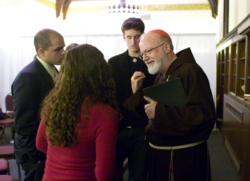Every Christian has a calling, cardinal tells BC students
CHESTNUT HILL -- Many view the Catholic Church as the church of “no,” Cardinal Seán P. O’Malley told a group of 50 Boston College students Jan. 30.
The cardinal’s talk was sponsored by BC’s Church in the 21st Century Center, which began as a program responding to the sexual abuse crisis and became a permanent center in 2005.
Increasing secularization around the world and a culture addicted to entertainment have caused people to perceive the Church as prohibitive. They see the Church as an institution with too many rules, including the weekly Mass requirement, the cardinal said.
“Many people are shocked, disturbed, when the Catholic Church doesn’t hesitate to proclaim that the Ten Commandments are the path that God has given us to lead a fulfilling human life,” he said. “Indeed the Church’s positions are often challenging, but they are like the restrictions of parents who love their children and want what is best for them.”
The small group of students, selected from various campus organizations, gathered in BC’s Gasson Hall to hear the cardinal. Following the cardinal’s remarks he fielded questions from the students on topics ranging from relations with the Orthodox Church to AIDS in Africa.
Cardinal O’Malley answered every question in light of God’s will, reminding students that they should do the same. About the latter question, he said that the fight against the AIDS epidemic in Africa has been most effective by encouraging Christian values. The wide distribution of condoms is not a solution, he added.
“It’s a difficult situation,” he said. “If someone is infected and going to have relations and affect someone else, that is wrong, and the Church would certainly discourage them from doing that.”
Forgetting those Christian values is causing many societies to drift away from God, and forgetting about God is perilous. While governments need not promote religious practice, they must protect religious freedom, he added.
“Religious freedom has never been as threatened as it is now,” he said.
The Church needs a new apologetics to respond to society’s increased secularization. Young people need to be catechized and to learn how to pray and how to worship, he said.
“In an increasingly materialistic culture, if we don’t have a prayer life and we don’t have a sacramental life, then we’re not going to survive in a life of discipleship,” he said.
The sacraments, especially the Eucharist, are central to a life of discipleship. The Mass is a time for all Catholics to gather and be connected to the Lord and to one another. It is about worshipping God, not what is gained from the experience, he said.
“Our culture is so addicted to entertainment that people come to church to be entertained. If we come to church only to be entertained, we’re likely to be disappointed,” he said. “But if we have a sense of God and of prayer in our life, then when we come to the liturgy we see it in an entirely different way. Helping people to learn how to pray is where we need to start. Once they pray, then the liturgy will mean something entirely different to them.”
Catholics are called to live their lives with a sense of vocation, he added.
One woman at the event asked, “For those of us who aren’t called into the religious life, what would you recommend for us to do? I look around the room, and I know a lot of us are interested in serving in different ways but are kind of unsure of how that fits into the Church and developing the Church as the body of Christ.”
Every Catholic is called to holiness and to the communal mission of the Church, Cardinal O’Malley responded.
“Even our career choices have to be informed by that desire to serve God and serve the community,” he said. “Every single one of us has a calling in life that we must prayerfully discern and generously and courageously embrace in our lives if we’re going to make a difference.”
The laity is called to engage in public life, transform society with the values of the Gospel and witness to God’s love, he said.
“The problem is that we must be convinced as a people that because you love, you say ‘no,’” he said. “If you always say ‘yes,’ that may be easier, but is that authentic, is that being faithful, is that being life-giving in the long run?”



















